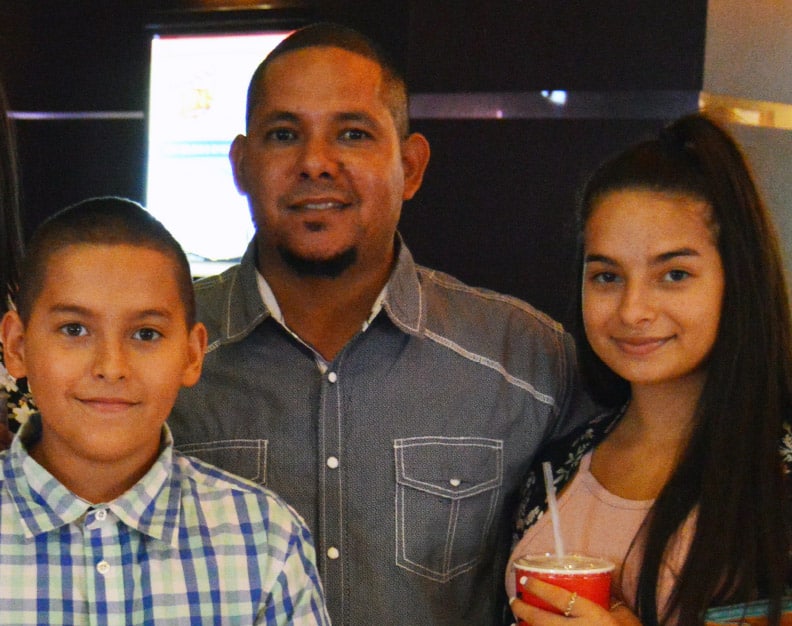Part Two Of A Story Of Second Chances And A Better Life
By Kerri Cooke
Elvis Martinez had been a child laborer and a fearless migrant in the face of what would have traumatized and even killed others less determined. He worked his way up in the world, had a successful career and a family. He had entered the U.S. illegally at 13. But after trying to become legal with the help of a lawyer, he was detained indefinitely in the country he had escaped over a decade before.
Two Years In Honduras
The adjustment from living in America for years to going back to the poverty in Honduras was jarring. As you have realized by now, Martinez is not afraid to work. However, it was almost impossible for him to find a job in Honduras due to one thing — his tattoos.
He has a rosary tattoo and his mother’s name across his chest, along with a few other tattoos.
What is commonplace here is entirely different in Honduras. If you have tattoos, people think you’re part of a gang, so they won’t hire you.
Martinez says people were scared of him, and he almost got killed three times. He was able to live due to money his friend, Begneaux, was sending him from the U.S.
Finally, a man named Francisco from Costa Rica hired him to do bodywork. Martinez was only able to work six months out of the 23 he was in Honduras.
And Martinez never got to see his kids while in Honduras. He said it was a horrible experience. “When you don’t see your kids for that long, it’s like a prison.”
At one point he told his lawyer that he couldn’t stand it anymore. Cox told him that she was working on his paperwork and said, “If you come in illegally again, you’ll lose everything.”
Finally in Aug., 2009, Martinez received word that his visa was ready and he could return to the United States.
A Family Reunion
Martinez says it was the “best time” when he saw his family and he “cried to see his kids.” His daughter ran to hug and kiss him. But his son was hiding because he didn’t recognize his dad. When he saw how his sister responded, he approached his dad, as well.
Hayden’s father said Martinez could stay there until he was back on his feet. By this time the relationship between him and Hayden was on the rocks. They would soon file for divorce.
Begneaux had held Martinez’s job at Shelter Lincoln Mercury. All his tools were still at the shop. So he went back to the same job he had before. After six months, he began to rent his own apartment in Iowa.
He also reestablished a relationship with his kids and shared custody with his ex-wife.
Visits Back To Honduras
In 2014, Martinez made his first visit back to Honduras since he had been detained there. It was a surprise visit to see his brothers, including Arriga, who had been deported.
Martinez wanted to go visit his brother the day he arrived, but was warned by his aunt to wait until the following day. Arriga had been walking a dangerous line — he had become involved with a drug lord’s woman. Luckily for Martinez, he listened to his aunt’s advice.
That evening Arriga, Martinez’s youngest brother and four children were outside when someone came by on a motorcycle, armed with an AK47. All six were gunned down.
He missed his father’s funeral in November, 2018, because he was in court being granted full custody of his children.
Martinez’s father had been sick for a while. He and his siblings had spent thousands of dollars to pay for his health care. His ailments included diabetes and heart and eye problems. He died at 64.
Martinez says, “America is a lot better than where we come from over there. You work all your life in not good conditions.” The harsh lifestyle ages you quickly and you die younger than you would in a developed country.
When he was finally able to get to Honduras, he organized some men to fix the graves in the graveyard where his parents are buried. Concrete was cracking and everything was in disrepair. After restoration work and a short visit, Martinez left. He says he didn’t stay long because he could get killed.
Martinez paints a bleak picture of Honduras and portrays the reasons large numbers of migrants are coming to the U.S. from the country.
Essentially, gangs control Honduras. Drug lords operate as the government. If you own a house, you have to pay the gang to live in it or they will kill you. When girls turn 11, gang members come and take them for prostitution. If the family refuses, the gang kills everyone.
The Path To Citizenship
Once Martinez was divorced and settled back into life in America, he decided to apply to become a U.S. citizen. He did the paperwork, paid the fees and went to the immigration office in New Orleans where he swore allegiance to America. When he got to the last step, he was denied. That’s when he found out that he had to be divorced five years. He only had been divorced three years.
Martinez had spent $1,800 on the application, his hotel, gas money and had wasted his time. He came away with nothing. He wasn’t even refunded his money.
He plans on applying to be a citizen again now that the time period is up. But as a recent first-time homeowner, he says he will probably wait another couple of years because the price has increased since he last tried.
The Future Looks Bright
Martinez is happy to have custody of his children. But being a single parent is never easy. He says it is “hard to do it by myself — hard, but not impossible.” He says getting to see them every day is worth it, and “giving them all this I never had is great.” He hopes to take his children to Honduras one day to show them where he came from.
Martinez says, “From 10 years ago in Honduras to now, it’s a lot of progress.” He has a home, custody of his children, a good job and still sends money to his family in Honduras.
“America equals opportunities,” Martinez says. “If you want it, go get it. Try to do better every day and appreciate what you have.”

















Comments are closed.